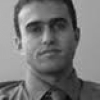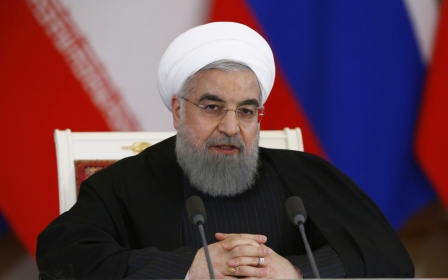It's the (Iranian) economy, stupid

Iran's first TV election debate on 28 April was the first opportunity for Iran’s presidential candidates to present their programmes and vision to a national audience. Although this first round was supposed to be devoted to social issues, it became a war of words over economic policy.
While incumbent Hassan Rouhani set out a vision of job creation as the most effective means of encouraging young people to marry, his rivals instead decided to focus on the government’s elitist approach to economic management.
Prominent conservative candidate, Mohammad Bagher Ghalibaf, led the charge by accusing Rouhani of prioritising the country’s 4 percent “elites” at the expense of the remaining 96 percent. This was a clever ploy that was clearly borrowed from the playbook of critics of Western-style capitalism.
In recent years, televised debates have emerged as one of the most important features of the country’s presidential elections
Perhaps the most striking feature of the debate was the poor performance of Rouhani, who was reduced to a sideshow as his deputy, Eshagh Jahangiri, took the lead in defending the government’s record.
Another surprise was the relatively poor performance of the lead conservative candidate, Ebrahim Raisi. Mild-mannered and softly spoken, the politically inexperienced Raisi proved to be no match for his leading opponents.
By contrast, the other prominent conservative candidate, Ghalibaf, performed exceptionally well and took the fight straight to Rouhani and his deputy.
Specifically, Ghalibaf’s heated exchanges with Jahangiri appeared to be a harbinger, even a preparation, for future political contests, possibly the 2021 presidential elections.
History of debates
In the absence of strong and durable political parties in Iran, candidates have limited opportunities to reach the electorate directly.
So in recent years, televised debates have emerged as one of the most important features of the country’s presidential elections, allowing candidates the opportunity to promote their programmes and attack rival visions.
In 2009, the debates proved devastatingly effective in the disputed presidential elections as rival candidates engaged in one-on-one debates. Their heated exchanges and personal attacks had a polarising effect on the elections and was, by extension, at least partially responsible for protests and rioting when the vote was over.
The authorities, in particular the Election Campaign Monitoring Commission, took note of this problematic format and, in the next presidential race in May 2013, introduced a panel format, where all candidates appear jointly on the debating platform.
While this format clearly reduces tension, it has many drawbacks, too. Namely, it makes it difficult for the main candidates to face off with a view to critiquing rival programmes in addition to projecting motives onto their rivals.
What are regarded as legitimate political methods and tactics in many mature democracies are instead viewed with suspicion by an Iranian establishment which has yet to fully recover from the shock of 2009-2010. The overriding priority of electoral officials is to prevent polarisation and, by extension, the potential for street-level protests and clashes.
The restrictions of this format notwithstanding, the current debating platform still has the ability to bring the strengths and weaknesses of candidates into sharp relief and is arguably one of the best ways to identify the lead issue in any given election.
Eye on the future
The debates also have the power to expose candidates unlikely to move forward as a result of their poor performance – in this case, the reformist Mostafa Hashemitaba, former head of the national Olympic committee, and the conservative Mostafa Mir-Salim, former minister of culture and Islamic guidance.
Of the remaining four candidates, Ebrahim Raisi caused a major surprise by his own relatively poor performance. Widely considered as the establishment’s choice, the 56-year old cleric is the custodian of the Imam Reza shrine in Mashhad and the vast business empire attached to it.
In the debate, Raisi focused on social justice and transparency, two issues about which he either has little experience or is insufficiently qualified to lecture. For example, the business and charitable empire attached to the Imam Reza shrine is often chided for lack of transparency and tax avoidance.
Raisi is expected to perform better in the next two debates, which will focus on foreign policy and national security. But based on his performance in the first one, it seems unlikely he can emerge as the leading challenger to Rouhani.
The man for that job appears to be Ghalibaf, the combative and sometimes flamboyant mayor of Tehran. The 55-year-old has a long record in policing and the security sector and was at one point the commander of the Revolutionary Guards air force.
Likely challenger
Ghalibaf has run for president in each election since 2005, and the last time around in 2013 he was a distant second to Rouhani. But based on his performance in the first debate, he appears to be better prepared this time. He cleverly tackled Rouhani on his failure to deliver on his 2013 campaign pledges and continuously trolled the president on his notorious ill-temper and inability to accept criticism.
Ghalibaf’s tactic was so effective that at one point Rouhani appeared to be truly fazed by the onslaught. However, a partial recovery came in the form of an intervention by the “support” candidate Jahangiri.
Ghalibaf repeatedly attacked the 59-year-old vice president for standing in the election only to support his boss, Rouhani. This is probably a correct assessment as it seems unlikely Jahangiri will actually run on polling day for fear of splitting Rouhani’s share of the votes.
But Jahangiri hit back, focusing on Ghalibaf’s record as mayor and his reputation for using heavy-handed tactics to suppress dissent and protests. Crucially, however, the vice president failed to set out his own programme and vision, instead concentrating on defending the sitting government’s record.
The heated exchanges between Ghalibaf and Jahangiri appear to be a test run for a more genuine contest in the next presidential race, scheduled for May 2021. This is all the more likely as Ghalibaf appears to be too ambitious to abandon his bid for the presidency this year.
Looking ahead to the next two debates, there are growing calls on the state broadcaster to enable the candidates to be more specific as to their respective programmes.
But what is clear is that the economy is likely to continue to loom large in the next debates as this is Rouhani’s Achilles heel, and one which his opponents, notably Ghalibaf, can fully exploit.
- Mahan Abedin is an analyst of Iranian politics. He is the director of the research group Dysart Consulting.
The views expressed in this article belong to the author and do not necessarily reflect the editorial policy of Middle East Eye.
Photo: Iranian presidential candidates (L to R) Hassan Rouhani, Mohammad Baqer Qalibaf, Eshaq Jahangiri and Ebrahim Raisi attend a live debate on state TV in Tehran on 28 April 2017 (AFP)
Stay informed with MEE's newsletters
Sign up to get the latest alerts, insights and analysis, starting with Turkey Unpacked
Middle East Eye delivers independent and unrivalled coverage and analysis of the Middle East, North Africa and beyond. To learn more about republishing this content and the associated fees, please fill out this form. More about MEE can be found here.





